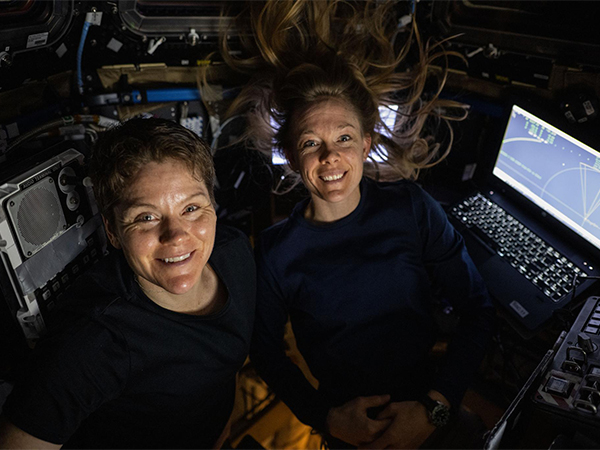
Washington DC: As the Expedition 73 and Axiom Mission 4 (Ax-4) crews kept up their ongoing space biology studies onboard the International Space Station, one of the research included that of brain research. Meanwhile, a Progress cargo craft counts down to its launch to resupply the orbital residents this weekend, NASA stated.
NASA Flight Engineer Nichole Ayers took her turn on Wednesday in the Columbus laboratory module wearing neck and chest electrodes measuring oscillations in the blood flow from her brain to the heart for the Drain Brain 2.0 human research experiment. Similarly, Ax-4 private astronaut Tibor Kapu wore a cap that imaged blood flow in his cerebral artery using doppler ultrasound for the Cerebral Hemodynamics investigation.
Veteran astronaut and Ax-4 Commander Peggy Whitson assisted Kapu with the biomedical hardware and measured his blood pressure inside the Tranquility module. Both studies are supported by different organizations with the first seeking to prevent space-caused blood clots and the second to protect crew visual processing and perception in microgravity, the statement said.
Ayers later joined her station crewmates Commander Takuya Onishi of JAXA (Japan Aerospace Exploration Agency) and NASA Flight Engineer Anne McClain for eye checks using high-resolution, near-infrared medical imaging hardware.
McClain led the B Complex optical investigation in the Harmony Module as Ayers and Onishi peered into the ocular device while doctors on the ground examined their optic nerve at the back of the eye in real time. Researchers are exploring using B vitamin supplements as a method to protect crew vision in microgravity, as per NASA.
NASA Flight Engineer Jonny Kim began his shift inspecting portable emergency hardware including fire extinguishers and breathing masks. After his lunch period, he joined his Soyuz MS-27 crewmates Sergey Ryzhikov and Sergey Zubritskiy, both flight engineers from Roscosmos, and practiced using respirator masks in the unlikely event of a chemical leak onboard the orbital outpost.
Ryzhikov and Zubritskiy started their shift repairing a Roscosmos treadmill in the Zvezda service module. Ryzhikov also wore virtual reality glasses for a study observing how a crew member's balance and visual perception adjust to microgravity. Zubritskiy serviced research physics hardware that measures neutron radiation. Flight Engineer Kirill Peskov spent his shift in the orbital outpost's Roscosmos segment servicing orbital plumbing gear and activating Earth observation equipment.
Ax-4 crewmates Shubhanshu Shukla and Slawosz Uznanski-Wisniewski partnered together in Columbus and studied using near-infrared technology to record brain activity for constructing brain-computer interfaces. Uznanski-Wisniewski wore a specialized cap connected via Bluetooth to a laptop computer recording his brain activity while Shukla optimized the signal quality and calibrated the hardware.
The pair also recorded and downlinked video of crew activities for the Astronaut Mental Health study. Shukla also looked at muscle cell stem cultures through a microscope to understand the muscle repair process in weightlessness.
The next uncrewed cargo mission, Progress 92, is counting down to its launch at 3:32pm (local time) on Thursday from the Baikonur Cosmodrome in Kazakhstan. Progress 92 is scheduled to dock to the Poisk module at 5:27pm (local time) on Saturday delivering about three thousand pounds of food, fuel and supplies for the orbiting lab residents, the statement said.